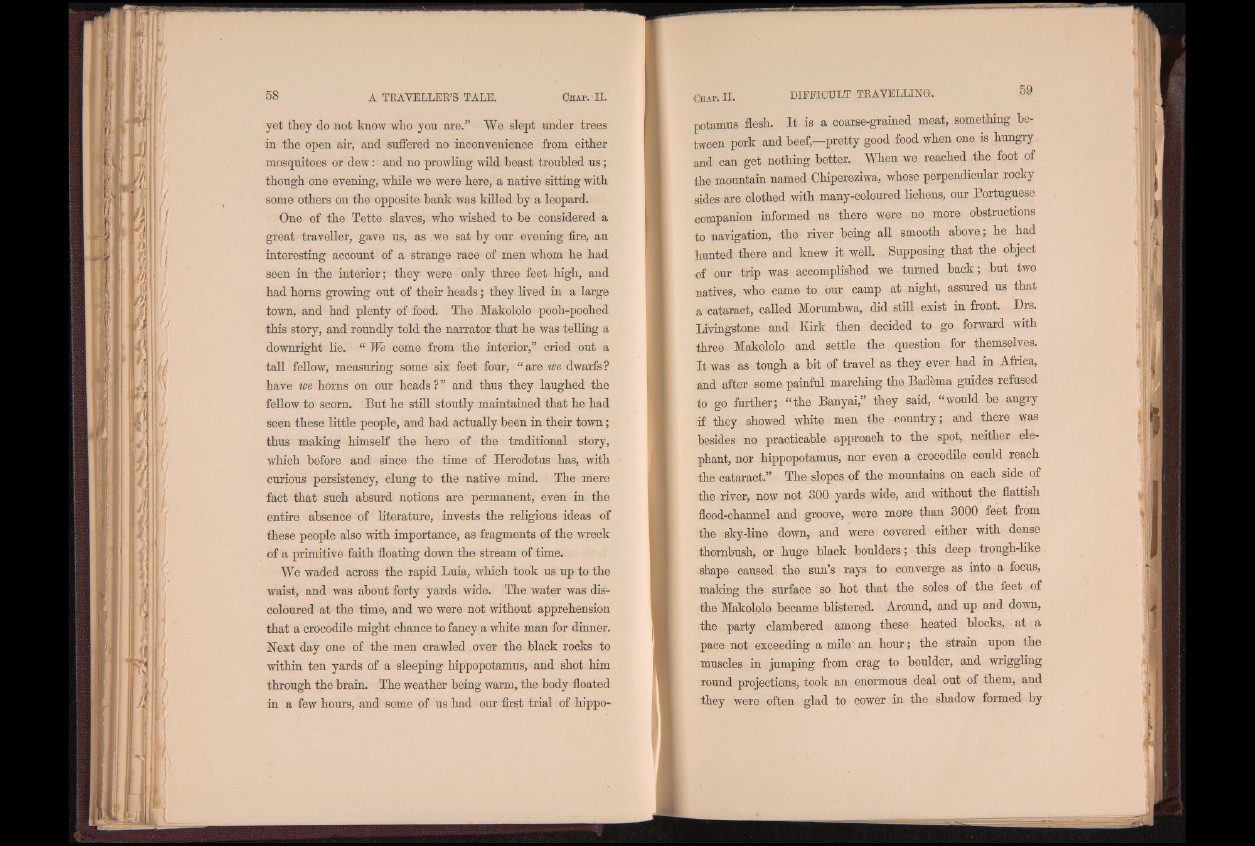
yet they do not know who yon are.” We slept under trees
in the open air, and suffered no inconvenience from either
mosquitoes or dew: and no prowling wild beast troubled u s;
though one evening, while we were here, a native sitting with
some others on the opposite bank was killed by a leopard.
One of the Tette slaves, who wished to be considered a
great traveller, gave us, as we sat by our evening lire, an
interesting account of a strange race of men whom he had
seen in the interior; they were only three feet high, and
had horns growing out of their heads; they lived in a large
town, and had plenty of food. The Makololo pooh-poohed
this story, and roundly told the narrator that he was telling a
downright lie. “ We come from the interior,” cried out a
tall fellow, measuring some six feet four, “ are we dwarfs?
have we horns on our heads ?” and thus they laughed the
fellow to scorn. But he still stoutly maintained that he had
seen these little people, and had actually been in their town;
thus making himself the hero of the traditional story,
which before and since the time of Herodotus has, with
curious persistency, clung to the native mind. The mere
fact that such absurd notions are permanent, even in the
entire absence of literature, invests the religious ideas of
these people also with importance, as fragments of the wreck
of a primitive faith floating down the stream of time.
We waded across the rapid Luia, which took us up to the
waist, and was about forty yards wide. The water was discoloured
at the time, and we were not without apprehension
that a crocodile might chance to fancy a white man for dinner.
Next day one of the men crawled over the black rocks to
within ten yards of a sleeping hippopotamus, and shot him
through the brain. The weather being warm, the body floated
in a few hours, and some of us had our first trial of hippopotamus
flesh. I t is a coarse-grained meat, something between
pork and beef,—pretty good food when one is hungry
and can get nothing better. When we reached the foot of
the mountain named Chipereziwa, whose perpendicular rocky
sides are clothed with many-coloured lichens, our Portuguese
companion informed us there were no more obstructions
to navigation, the river being all smooth above; he had
hunted there and knew it well. Supposing that the object
,0f our trip was accomplished we turned back; but two
natives, who came to our camp at night, assured us that
a cataract, called Morumbwa, did still exist in front. Drs.
Livingstone and Kirk then decided to go forward with
three Makololo and settle the question for themselves.
It was as tough a bit of travel as they ever had in Africa,
and after some painful marching the Badema guides refused
to go further; “ the Banyai,” they said, “would be angry
if they showed white men the country; and there was
besides no practicable approach to the spot, neither elephant,
nor hippopotamus, nor even a crocodile could reach
the cataract.” The slopes of the mountains on each side of
the river, now not 300 yards wide, and without the flattish
flood-channel and groove, were more than 3000 feet from
the sky-line down, and were covered either with dense
thornbush, or huge black boulders; this deep trough-like
shape caused the sun’s rays to converge as into a focus,
mak in g the surface so hot that the soles of the feet of
the Makololo became blistered. Around, and up and down,
the party clambered among these heated blocks, at a
pace not exceeding a mile'an hour; the strain upon the
muscles in jumping from crag to boulder, and wriggling
round projections, took an enormous deal out of them, and
they were often glad to cower in the shadow formed by